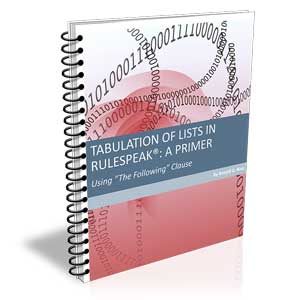Let's Make a Deal: A Killer App for Business Rules
In my last column, "The Re's of Business Rules,"[1] I categorized the various types of business rule projects we have been seeing. One of those categories is what I call "Re-empowerment." This potent new category deserves a closer look.
This type of project focuses on opportunities in the general area of customer relationship management (CRM) -- in particular, on making deals. Deals (or more precisely, contracts and agreements) are how the company formalizes what I call the ‘rules of engagement' with each customer.
Just about every company these days, of course, wants more and more customers -- and highly individualized relationships with each and every one of them. Making the situation even more challenging is that products and services in today's economy are also increasingly complex and/or differentiated. So the question becomes how can you manage highly individualized or even "one-of-a-kind" agreements for increasingly complex and differentiated products for increasingly large numbers of customers? And by the way, do it economically, flexibly, and quickly?
One thing I can tell you for sure -- you are not going to do it successfully the way it's been done in the past. The traditional approach might be summarized as follows. A manager, marketing rep, and/or lawyer comes to some agreement with a customer. Such agreement might be about the acquisition of a product/service as a whole (including options, timing, pricing, delivery, etc.), or some specific aspect thereof (e.g., discounts). Once formalized (e.g., in a contract, agreement, letter of understanding, etc.), it is then handed over to the programming staff (or if simpler, to the operational staff) to implement and "operationalize." Depending on its complexity and the availability of resources, this might take weeks or months -- a virtual lifetime at this crucial juncture in building the customer relationship.
There are at least three things fundamentally wrong with this approach.
- First, it is far too slow. These days, operationalizing an agreement needs to take place in hours or days -- not weeks or months.
- Second, it cannot be effectively managed. Even if the programming and/or implementation is done correctly (a very big ‘if'), the resulting code is far removed -- almost completely disconnected -- from the original agreement. Any resemblance in form is vague at best. Subsequent changes in the rules -- the name of the game these days -- is inevitably a slow, painful, and expensive affair.
- Third, the approach is also deeply flawed from an organizational viewpoint. Those workers in actual contact with the customers are displaced from those with the skills to adjust the implemented rules of engagement. This leads to gaps, inefficiency and frustration all around.
The business rule approach offers a potent two-part solution.
- First, "deals" are nothing more than collections of high-level business rules. (We call these "governing rules.") The business rule approach has already evolved effective techniques to interpret and manage such rules.
- Second, the "programming" of deals clearly must be eliminated. Rule engines solve that problem by allowing the rules of engagement to be implemented much more directly.
This approach produces a huge additional advantage -- much of the business rule activity can now go ‘outboard.' By this I mean it can be removed from IT and distributed to those directly in contact with the customers. This will empower those users to manage the rules of engagement directly. I believe enabling these Power User Rule Groups will prove a killer app for business rules!
References
About our Contributor:
Online Interactive Training Series
In response to a great many requests, Business Rule Solutions now offers at-a-distance learning options. No travel, no backlogs, no hassles. Same great instructors, but with schedules, content and pricing designed to meet the special needs of busy professionals.










How to Define Business Terms in Plain English: A Primer
How to Use DecisionSpeak™ and Question Charts (Q-Charts™)
Decision Tables - A Primer: How to Use TableSpeak™
Tabulation of Lists in RuleSpeak®: A Primer - Using "The Following" Clause
Business Agility Manifesto
Business Rules Manifesto
Business Motivation Model
Decision Vocabulary
[Download]
[Download]
Semantics of Business Vocabulary and Business Rules